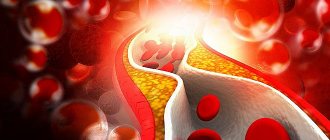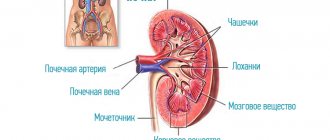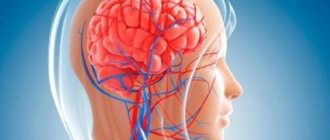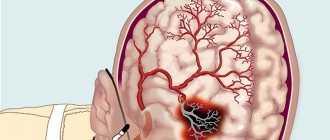What is metabolism?
Metabolism can be divided into 2 important processes that occur in the body in parallel:
- Anabolism (assimilation, plastic metabolism).
- Catabolism (dissimilation).
Anabolism is the synthesis of substances within the body, which expends energy. Assimilation includes the biosynthesis of proteins, carbohydrates, nucleic acids, and fats. The most active process of plastic metabolism occurs in a growing organism.
Catabolism is the process of decomposition of substances into simpler elements, due to which the body stores energy that is used to maintain life. The simplest example is getting nutrients from food. It happens like this:
- Substances entering the body with food.
- Absorption from the digestive tract.
- Assimilation.
- Removal of breakdown products unsuitable for absorption.
For the normal functioning of the body, the balance of these two processes is important. When it is violated, various pathologies arise.
The following types of metabolism may be disrupted:
- Belkovoy.
- Carbohydrate.
- Water.
- Lipid (fat).
- Mineral.
Drug therapy
Metabolic disorders (symptoms in women require the help of a therapist, and, if necessary, other specialists) in some situations are provoked by congenital pathologies or various diseases.
After diagnosis, the doctor will establish an accurate diagnosis and prescribe medication:
| Group of drugs | Name | Application |
| Thyroid drugs | "Iodide", "L-thyroxine" | Drugs are prescribed for dysfunction of the thyroid gland. Take 1 rub. per day, washed down with milk or juice. The duration of therapy is 3-6 months. |
| Hormonal drugs | "Actovegin", "Amarin" | Medicines help restore hormonal imbalances. The standard dosage is 1-2 tablets. 3 r. per day for 4-6 weeks. |
| Insulin | "Insuman", "Levemir" | Medicines are selected for people with diabetes. The average daily dosage ranges from 0.5 to 1 IU/kg. |
| Enzymes | "Trypsin", "Lidaza", "Ranidaza" | The adult dosage is 5 mg 1-2 r. per day. Before the injection, the medicine is diluted with saline solution (0.9%). The course of treatment includes 20 injections. |
| Amino acids | "Glycine", "Methionine" | The drug is prescribed 1 tablet. (100 g) 2-3 r. per day for 14-30 days. The medicine eliminates disorders and restores metabolism, reduces emotional stress and promotes mental performance. |
| Antimicrobial agents | "Aspirin", "Dipyridamole" | The drugs eliminate pain and stop inflammatory processes. Prescribed 100 mg 3 times. per day. Therapy continues for 7-10 days, unless an adverse reaction occurs. |
To restore impaired metabolism, taking into account the provoking factor and the characteristics of pathological processes, antidepressants and drugs that accelerate or slow down metabolism are also prescribed. In some situations, homeopathic remedies are used.
Medicines are prescribed by the doctor after a complete diagnosis based on the results obtained. Many drugs cause side effects, which should be taken into account and self-therapy should be avoided.
Restoring metabolic disorders in a woman’s body is a long process. You will need the help of a general practitioner who, based on complaints and existing symptoms, will select the most effective solution. Therapy is carried out comprehensively, starting from a correct lifestyle and ending with medications if the disorders are complicated.
Article design: Oleg Lozinsky
Causes of metabolic disorders
The main causes of metabolic disorders include:
- Stress.
- Genetic predisposition (congenital deficiency of certain enzymes).
- Unbalanced diet.
- Intoxication.
- Frequent diets.
- Bad habits: smoking, drinking alcohol.
- Malfunctions of the thyroid gland, adrenal glands, pituitary gland.
- Taking hormonal contraceptives and other medications.
- Worm infestations and other parasitic infections.
- Viral diseases - influenza, measles, chickenpox.
- Sedentary lifestyle.
Congenital metabolic diseases
Congenital pathologies can be divided into 3 large groups. These include violations:
- Metabolism of small molecules (failures in the metabolism of carbohydrates, neurotransmitters, neuromodulators) - diseases that cause failures of intermediate metabolism.
- Energy metabolism – insufficient energy production and consumption.
- Metabolism of complex molecules - pathologies that interfere with the production of complex molecules.
Metabolic disorders: symptoms
Common signs of metabolic failure are:
- Unhealthy skin color.
- Labored breathing.
- Sudden weight gain or loss without objective reasons.
- Joint and muscle pain.
- Deterioration in the quality of hair, nails, skin.
- Thermoregulation disorders (increased sensitivity to cold and heat).
- Sleep problems.
- Changes in blood pressure.
- Edema.
- Prolonged increase or decrease in body temperature.
- Frequent urination.
- Bowel problems: diarrhea or constipation.
- Memory impairment.
- Mood swings.
- Skin rashes.
- Tooth decay.
Symptoms of metabolic disorders in women include infertility and menstrual irregularities (the most common manifestation is scanty discharge).
Also, failures of different types of exchanges may have their own signs, identified by the results of laboratory tests. If carbohydrate metabolism is disturbed, the following may occur:
- Changes in the concentration of glucose in the blood (therefore, a common consequence of a failure of carbohydrate metabolism is diabetes mellitus - a violation of the absorption of glucose).
- Presence of glucose in urine.
Symptoms of lipid metabolism (its disturbance is usually associated with deterioration in the digestion and absorption of fats) are:
- Steatorrhea (presence of lipids in stool).
- Development of cholesterolosis (deposition of cholesterol in cell membranes or on the walls of blood vessels).
Signs of protein metabolism disorders are:
- Content of uric acid in the blood.
- Presence of amino acids in urine.
- Increased bilirubin levels in the blood.
Diagnosis of metabolic syndrome
Diagnosis of MS consists of a visual examination by a doctor and laboratory and instrumental studies.
First of all, the doctor evaluates abdominal obesity. But excess weight alone is not enough to make a diagnosis. Other symptoms and test results are also assessed. It is also important to discover the cause of obesity. Excess weight can be a consequence of endocrine disorders, hormonal imbalances or other pathologies. Another important criterion when making a diagnosis is blood pressure. In metabolic syndrome it is usually increased.
An ECG is required to check the functioning of the heart and detect pathologies in time if the disease is already advanced.
Angiography. A complex study that allows you to assess the condition of blood vessels. Carried out only as prescribed by a doctor.
Laboratory tests that are prescribed if metabolic syndrome is suspected:
- Glucose. The first and most informative analysis. In MS, plasma sugar levels are significantly elevated. More detailed information about glucose metabolism can be obtained by taking a blood test for glycosylated hemoglobin (HBA1c), which reflects the average blood glucose level over the past 3 months.
- Lipid profile. For diagnosis, it is important to know the level of low- and high-density lipids (LDL and HDL), total cholesterol, and triglycerides. With MS, these indicators do not correspond to the norm; the content of “harmful” fats in the blood increases, which increases the risk of plaques in the blood vessels.
- Insulin. Its level also usually increases in MS.
- Homocysteine. Elevated levels of this amino acid increase the risk of blood clots and problems with the heart and blood vessels.
- C-reactive protein. A marker of inflammatory processes in the body. In metabolic syndrome, its level often exceeds the normal limit.
A glucose tolerance test may also be prescribed.
This study checks glucose levels over time: on an empty stomach and two hours after a carbohydrate load. Diagnosis of metabolic syndrome is a complex and complex task, which is complicated by the variety of forms of the disease, its causes and methods of correction. This condition is also dangerous because a person does not feel sick for many years. Well-being begins to suffer when significant deviations in the body’s functioning appear and complications develop. No person can experience elevated blood glucose levels or impaired cholesterol metabolism. Only very serious problems caused by these disorders make themselves known - for example, purulent inflammation of the toes or a heart attack.
The International Classification of Diseases does not distinguish metabolic syndrome as a separate disease; it is a whole complex of diseases.
No diagnosis can be made independently, but any deviation in research results is a reason not to delay going to the doctor.
Consequences of metabolic disorders
Metabolic disorders can lead to the development of the following diseases:
- Diabetes mellitus is the body’s inability to absorb glucose due to a failure in the synthesis of the hormone insulin.
- Coronary heart disease – acute or chronic damage to the heart muscle (myocardium) due to a violation of its blood supply.
- Atherosclerosis is a chronic disease in which narrowing of the lumens of blood vessels occurs due to deposits on their walls (atherosclerotic plaques).
- Obesity is an increase in body weight due to pathological fat deposits.
- Gout is an inflammatory disease of the joints.
Metabolic disorders can also cause:
- Deterioration of bones and muscles.
- Delayed growth and development in children.
- Malfunctions of the cardiovascular system.
In children, the consequences of metabolic disorders can be:
- Rickets is a disorder of bone formation.
- Anemia (anemia) is a lack of erythrocytes (red blood cells that transport oxygen).
Popular questions
What happens if metabolic disorders are not treated?
Lack of treatment can lead to serious illness. For example, when there is a lack of iron in the body, iron deficiency anemia develops. This disease can cause a decrease in the body's defenses, poor healing of wounds and injuries, disrupt the contractile function of the heart, lead to respiratory failure and impaired circulation in organs, and slow down the synthesis of thyroid hormones.
Lack of iodine leads to irreversible changes in the function and structure of the thyroid gland, decreased intellectual abilities, slower metabolism and other more severe consequences. Dehydration is completely life-threatening; this condition should be treated as soon as possible. That is why it is important to seek professional medical help for any type of disorder.
Can endocrine diseases disrupt metabolism and cause weight gain?
Among the internal causes of metabolic disorders, endocrine diseases occupy the first place. A lack or excess of certain hormones can be associated with congenital anomalies, neoplasms, inflammatory processes, stress, deficiency of micro- and macroelements, drinking disorders, severe infectious diseases, etc. Yes, excess body weight can be associated with metabolic disorders and endocrine diseases, but more often appears due to external factors - family nutrition stereotypes, chronic overeating, high calorie food and physical inactivity.
Can metabolic disorders be prevented?
Only acquired metabolic disorders can be prevented. To do this, you should follow some medical recommendations:
- eat rationally, do not starve or overeat. Refuse mono-diets, limit intake of flour, fatty foods, fried foods;
- take vitamins, micro- and macroelements in consultation with a doctor in case of insufficiency and, if you are forced to limit the consumption of certain products;
- get enough rest, sleep at least 6–8 hours a day;
- quit smoking and alcohol;
- pay attention to physical activity;
- learn to resist stress or, if possible, eliminate emotional turmoil.
It is important to deal with eating disorders in a timely manner and at the first symptoms of pathology, consult a psychotherapist or nutritionist. Specialists at the VegaMed clinic successfully treat metabolic disorders. We provide comprehensive assistance: we carry out fast, accurate, informative diagnostics, and offer consultations with specialized specialists necessary for the full treatment of the disease. We have everything necessary to take effective measures - modern diagnostic and therapeutic equipment. The clinic's doctors are qualified specialists with many years of experience.
Diagnosis of metabolic disorders
To diagnose a metabolic failure, you need to consult a therapist. He will conduct an examination, collect anamnesis and refer the patient for studies, including:
- Blood and urine tests (general, biochemical, glucose).
- Glucose tolerance test.
- Blood cholesterol level test.
- Lipid profile.
- Computer tomogram.
- ECG.
Also, depending on the symptoms, instrumental studies (primarily ultrasound) of the kidneys, liver, pancreas, and organs of the endocrine system can be performed.
Complications
There are two main dangers with this disease:
- Diabetes mellitus type 2. If you don't make lifestyle changes and get your excess weight under control, you may develop insulin resistance, which can cause high blood sugar levels. It ultimately leads to type 2 diabetes.
- Diseases of the heart and blood vessels. High cholesterol and high blood pressure contribute to the formation of plaque in the arteries. These plaques narrow the arteries, which can lead to a heart attack or stroke.
Treatment
The tactics for treating metabolic disorders depend on the complexity and causes of the pathology. Minor glitches can be resolved by:
- Nutrition corrections.
- Lifestyle changes - maintaining a daily routine.
- Prescriptions of vitamin-mineral complexes.
- Physical education classes.
The type of diet depends on the nature of the disorder. In most cases, split meals are recommended: small portions, every 2-3 hours. Also exclude fried, pickled, salty, spicy, fatty foods. Limiting carbohydrates and animal fats may be necessary.
If the disorders are caused by enzyme deficiency or diseases, appropriate treatment is carried out. So, for diabetes mellitus, insulin therapy can be prescribed (if required), for thyroid diseases - hormonal medications. In some cases, surgical intervention is required (in the presence of goiter, pituitary adenoma).
Also, in case of metabolic disorders, sanatorium-resort treatment can be prescribed.
If you have symptoms of metabolic failure, you should consult a doctor. First, to fix a problem, you need to know its cause. This is impossible without diagnostic studies. This means that the patient will act according to intuition, which not only will not give the desired result, but can also aggravate the disorders. Secondly, self-medication often means taking vitamin-mineral complexes and dietary supplements. Again, not knowing exactly what substances the body lacks can increase the imbalance. And an excess of vitamins and minerals is no less dangerous than their deficiency.
Treatment of metabolic disorders requires an integrated approach. The patient may need the help of several specialists at once, for example, an endocrinologist, nutritionist, or psychotherapist. A psychotherapist will help you get rid of stress and sleep problems.
Treatment with folk remedies
It is recommended to discuss the use of recipes from witch doctors and healers with your doctor to prevent possible side effects. Many components can provoke an allergic reaction or worsen health conditions. There are also certain contraindications that you should pay attention to before starting treatment with folk remedies.
Effective alternative medicine recipes:
| Name | Recipe | Application |
| Herbal tincture | Mix chamomile, knotweed, birch buds, St. John's wort and immortelle, 100 g each. Grind the components well. Before use, pour 15 g of the resulting mixture with hot water (500 ml). | The tincture is consumed 35 minutes before meals; you can add a spoonful of honey for taste. |
| Blooming Sally | Pour boiling water (500 ml) over 30 g of herb. Leave for 30 minutes and strain. | The product is taken in 70 ml 4 times. per day before meals. |
| Dandelion root tincture | Grind the roots (20 g) and pour vodka, or alcohol (1 tbsp.). Infuse for 14 days in a dark place. Strain the medicine and take it according to the schedule. | In case of impaired material metabolism, it is recommended to drink 35 drops of the tincture. 3 r. per day before meals. |
| Garlic tincture | Grind the main product (350 g). Add vodka (200 ml), leave in a cool, dark place for 10 days. Strain the resulting tincture, squeeze and take according to the scheme. | The medicine is taken for 11 days. The dosage is gradually increased from 2 to 25 drops. |
| Walnut leaves | Pour 2 tsp. leaves with hot water (1 tbsp.). Leave for 2 hours, then strain. | The product is taken 100 ml before meals, 4 rubles. per day. |
To restore the metabolic process, it is also recommended to consume dandelion leaves in a salad or juice obtained from them. The leaves of this plant can also be brewed and drunk instead of tea.
Prevention
Prevention of metabolic failures includes:
- A balanced diet with a limit on fatty, starchy, sweet foods and the inclusion of fruits, vegetables, lean meat, and dairy products in the diet.
- Avoiding overeating and fasting.
- Maintaining vitamin and mineral balance in the body (to control it, preventive blood tests should be taken).
- Developing stress resistance and avoiding emotional shocks.
- Quitting bad habits - alcohol reduces the production of testosterone, which is necessary to maintain the quality of muscle mass, and when smoking, toxins enter the body, which is why energy is spent on detoxification.
When developing a diet, it is recommended to consult a nutritionist. He will take into account all the needs of the patient’s body and develop an individual diet that allows him to maintain metabolic processes in optimal condition.
Also, the prevention of metabolic disorders is a timely visit to a doctor. You should make an appointment as soon as you notice at least a few symptoms of metabolic failure.
Sports activities
Metabolic disorders (symptoms in women that appear at an early stage will help identify the disease and take action) can be restored with regular physical activity.
Sports activities have a positive effect on the general condition of the body, thereby supporting proper metabolism:
- increase energy costs;
- accelerate metabolic processes;
- increase the activity of the glands;
- increase the tone of the central nervous system;
- restore motor-visceral reflexes responsible for the metabolic process.
A specialist will help you select exercises, taking into account the woman’s condition and the individual characteristics of her body. For the first time, it is recommended to give preference to a simple gymnastics complex.
Along with playing sports, if there is a metabolic disorder, you should regularly take walks in the fresh air, walk, and run. It is important to devote at least 1 hour a day to active physical activity. Slow metabolism requires heavy loads and movements with high amplitude. It is recommended to run slowly and at intervals.











